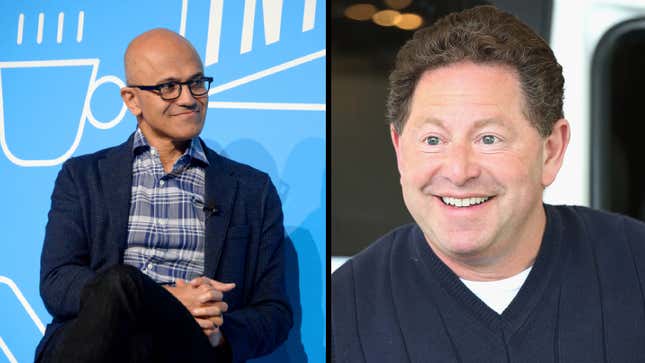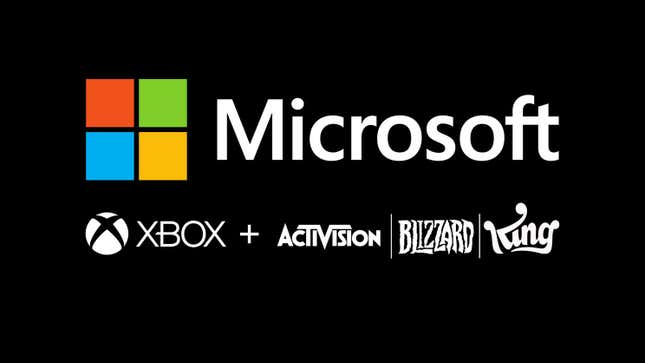
Microsoft revealed a bombshell today: it’s buying embattled Call of Duty publisher Activision Blizzard in the largest gaming industry acquisition ever. That means a lot of things, including that the head of Xbox, Phil Spencer, will soon be veteran CEO Bobby Kotick’s new boss. But what that means for the man currently accused of letting sexual harassment, discrimination, and misconduct run rampant at his company for years remains unclear.
First reported by The Wall Street Journal, the $68.7 billion deal for Microsoft to acquire Activision Blizzard would put some of the biggest franchises in games under the Xbox umbrella, including Overwatch, Diablo, Call of Duty, and Candy Crush. And despite a wave of unsettling reports and allegations about how some employees were treated at the company, head of Microsoft, Satya Nadella, offered glowing praise of the man who’s been running things throughout.
“Over more than 30 years as CEO of Activision Blizzard, Bobby Kotick has built the company into one of the world’s most successful and influential entertainment companies and I’m grateful to his leadership and commitment to real culture change,” Nadella said during an investor call today, sidestepping the mountain of abuse recently uncovered at the game industry giant to focus on the business upside. After all, once the deal goes through, Microsoft will become the third biggest gaming company in the world.
Microsoft is also being cagey about whether Kotick will remain as head of Activision Blizzard once the acquisition is complete.
“Bobby Kotick will continue to serve as CEO of Activision Blizzard, and he and his team will maintain their focus on driving efforts to further strengthen the company’s culture and accelerate business growth,” a spokesperson for Microsoft wrote in a press release today. “Once the deal closes, the Activision Blizzard business will report to Phil Spencer, CEO, Microsoft Gaming.” A follow-up statement meant to clarify Kotick’s future was similarly vague.
[Update: 1/18/22, 11:27 a.m. ET: Kotick told The New York Times he will be “available as needed” after the deal closes. Update: 1/18/22, 2:46 p.m. ET: And sources The Wall Street Journal spoke with claim the companies have “have agreed that [Kotick] will depart once the deal closes.”]
Microsoft didn’t immediately respond to a request for comment squaring Nadella’s praise for Kotick, who many including, nearly 2,000 of his own employees, have called on to resign, with Spencer saying last year he was “disturbed and deeply troubled” by the allegations about Activision Blizzard. Management remained intact at Bethesda Softworks, Microsoft’s last big gaming purchase, though the Fallout and Elder Scrolls-maker wasn’t in the midst of a major #MeToo reckoning.
Read More: Everything That Has Happened Since The Activision Blizzard Lawsuit Was Filed
Following the filing of a lawsuit by the California Department of Fair Employment and Housing last July alleging widespread sexual harassment, discrimination, and other forms of mistreatment at the company, new report after new report has unearthed additional details about misconduct and bad working conditions at Activision Blizzard. This included female employees being sexually preyed upon, subject to heckling by drunken male coworkers during “cube crawls” at work, and worse. The company has since moved to settle an $18 million lawsuit with federal regulators over discrimination, and stated its commitment to improving its workplace culture, while simultaneously trying to stamp out unionization efforts among its employees.

Last November, an investigation by The Wall Street Journal implicated Kotick, who had previously feigned innocence of the worst of the abuses that happened under his watch, of mistreating former female employees himself, and even going so far as to intervene to prevent a male studio head accused of sexual harassment from being fired for it. More recently, The Wall Street Journal reported that Kotick was still trying to prevent the full scope of misconduct at the company from coming out, though a spokesperson for Activision Blizzard called that “inaccurate.” In the meantime, employee, shareholder, and industry pressure on Kotick has been building, with heads of the major console manufacturers calling recent allegations disturbing in emails to staff.
One of those executives was Spencer. In an internal email from last November he wrote, “This type of behavior has no place in our industry,” and said Microsoft would be making “adjustments” to how it does business with Activision Blizzard in the future. He elaborated on what that meant in a series of wishy-washy remarks earlier this month that now read as attempts to not bad mouth a soon-to-be employee of Xbox.
“We have changed how we do certain things with [Activision Blizzard], and they’re aware of that,” he told The New York Times’ Sway podcast. “But I also—this isn’t about, for us as Xbox, virtue-shaming other companies. Xbox’s history is not spotless.” (In addition to a 2016 Xbox GDC party with scantily clad dancers, Microsoft just re-opened a review of its sexual harassment policies over concerns about former CEO and co-founder Bill Gates’ alleged sexual advances toward female employees).
Spencer refused to directly call out and criticize Kotick or his company during that interview, despite repeated attempts by host Kara Swisher to get him to. “I would say in terms of individuals that are in leadership positions at other companies, it’s not obviously our position to judge who the CEOs are,” he said. “Like, CEOs are chosen by shareholders and boards. At Xbox, I know who I’m accountable for here in terms of the business and the operations. It’s my teams here, my management chain. And that’s the thing that we continue to focus on, is to try to grow.”
Pretty soon, Kotick will be accountable to Spencer, and the Xbox boss who has worked so hard to re-brand the platform as inclusive and diverse won’t be able to dodge questions about the Activision Blizzard CEO’s future any longer.
“As a company, Microsoft is committed to our journey for inclusion in every aspect of gaming, among both employees and players,” Spencer wrote in a blog post today. “We deeply value individual studio cultures. We also believe that creative success and autonomy go hand-in-hand with treating every person with dignity and respect. We hold all teams, and all leaders, to this commitment. We’re looking forward to extending our culture of proactive inclusion to the great teams across Activision Blizzard.”
Time will tell if that culture will at Microsoft will have room for Kotick.
Update: 1/18/22, 11:10 a.m. ET: Added more context around Microsoft’s own workplace history.